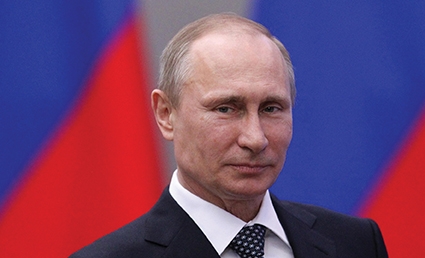Putin’s Imperial Coronation
Op-Ed
In March, Russia will hold its presidential elections, in which the incumbent President is widely expected to retain his post. Putin has reached an apogee of power. He’s already been in power for 18 years either as President or PM of Russia. Under his rule, Russian military power has experienced a definite resurgence through military campaigns across the Eurasian landmass, while internally the country, although experiencing economic difficulties, is more stable than it was in the 1990s.
Everyone understands that Putin’s fourth term as President will probably be his last, as he is already quite advanced in age. He has worked hard to cleanse his way to the office through systematic campaigns to boost his popularity. According to the state-run pollster VTsIOM, 66% of voters are prepared to vote for Putin. Reputable, independent pollster Levada also shows high numbers for Putin’s popularity.
Indeed, Putin’s unchallenged victory is also guaranteed by the fact he lacks serious opposition. Alexey Navalny, a major anti-corruption campaigner in Russia, has been barred from running for presidency for alleged corruption charges. Moreover, Navalny’s foundation was closed several days ago. Another candidate, Ksenya Sobchak, famous Russian socialite, enjoys only minor popularity.
However, if there is any semblance of viable opposition, quite surprisingly, it comes from the Communist party. Last December, technocratic party (since 1993) leader Gennady Zyuganov, which has been nominated many times in presidential elections, stepped back, leaving his place to Psvel Grudinin, whose natural charisma is new for the Communist Party. This may help fuel a revival of Communist nostalgia. Grudinin represents a modern version of socialism, while, according to a recent Levada poll, 58% of Russians regret the Soviet Union’s collapse.
However, this does not mean that Grudinin will somehow be able to challenge Putin. Indeed, although Grudinin is in fact second to Putin, he still holds just 6% of the electorate.
All points to the fact that Putin will remain in office for another six years. He even chose the date of the elections, 18 March, to coincide with the anniversary of his takeover of the Crimean Peninsula in 2014. March 18 will be an imperial coronation for Putin.
All not Good on the Ground
As rosy as it seems, Putin’s fourth presidential term will be markedly different from what he has experienced so far. In fact, under Putin, Russian foreign policy has experienced deep crises on the global stage. By the early 2000s, for instance, Moscow enjoyed pretty much uncontested political and military influence in its neighborhood, except for Estonia, Lithuania and Latvia. But under Putin, in the South Caucasus, Russian foreign policies have led to a deterioration of relations with Tbilisi, particularly after the revolution of 2003 (seeing the coming to power of the overly ambitious Mikheil Saakashvili), resulting in an open military confrontation in 2008. Moscow built its military bases in Abkhazia and South Ossetia, but its southern flank remains vulnerable as Tbilisi has been quite successful in moving towards western military and political integration.
Moving to the north-west, to the modern Ukraine, one could easily see how the political landscape dramatically changed and not in Moscow’s favor. Where, before 2014, through Ukraine’s neutrality, the Russian position in the country was well secured both economically and politically - and in case of necessity Moscow could even project its influence to the furthest points of western Ukraine and thus reach the heart of Europe - nowadays Russian control only extends to east Ukraine and parts of the Black Sea through the incorporated Crimea.
Further west in Moldova, too, Russian influence, although it has been somewhat on the rise recently (because of the elected pro-Russian Igor Dodon), has declined. The country once characterized as being openly pro-Russian, is trending towards becoming pro-European.
Up in the north, in Belarus, Russia still enjoys a predominant position. But even in this often considered “most pro-Russian” country, sentiments towards Moscow are not always positive. Paradoxically, the war in east Ukraine and the annexation of Crimea by Moscow, meant to send direct political messages to all countries across the former Soviet space, has led to rather different thinking in Minsk. President Alexander Lukashenka, with his acute understanding of the balance of power in the region, a couple of years ago initiated a policy of rapprochement with the West. The latter has accused him of autocratic rule and regularly imposed sanctions on the country since the 1990s, but over the past two years there have been some positive steps towards lifting some of the sanctions and extending closer economic ties.
Thus, although it is true that Putin is at the apogee of his power, on the ground we see that Russia in fact experiences troubles keeping its fragile post-Soviet satellite empire across Eurasia. Putin will be President, but it will a different presidency from the past, beset with more geopolitical challenges than ever.
Emil Avdaliani












